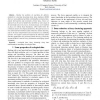Free Online Productivity Tools
i2Speak
i2Symbol
i2OCR
iTex2Img
iWeb2Print
iWeb2Shot
i2Type
iPdf2Split
iPdf2Merge
i2Bopomofo
i2Arabic
i2Style
i2Image
i2PDF
iLatex2Rtf
Sci2ools
153
click to vote
EUSFLAT
2009
2009
A Fuzzy Set Approach to Ecological Knowledge Discovery
Besides the problem of searching for effective methods for extracting knowledge from large databases (KDD) there are some additional problems with handling ecological data, namely heterogeneity and uncertainty of these data. A fuzzy set approach can be used to handle these problems at some stages of the knowledge discovery process. Ecological data can be defined as fuzzy sets without sharp boundaries, which reflect better the continuous nature of ecological parameters. The paper focuses on one of the important methods of data reduction, namely clustering, and on the data transformation and construction of a combining operator. Two support systems developed at the University of Kiel and their applications are presented, namely the Fuzzy Clustering System ECOFUCS and the Fuzzy Evaluation and Kriging System FUZZEKS. Keywords-- ecological data, fuzzy clustering, fuzzy data transformation, uncertainty of ecological data. 1 Some properties of ecological data Dealing with a very large data ba...
Related Content
| Added | 17 Feb 2011 |
| Updated | 17 Feb 2011 |
| Type | Journal |
| Year | 2009 |
| Where | EUSFLAT |
| Authors | Arkadiusz Salski |
Comments (0)

